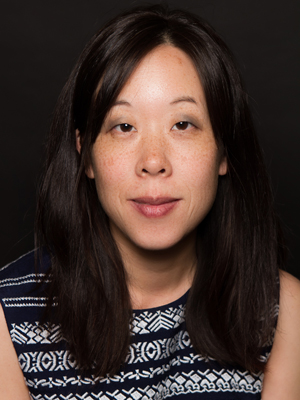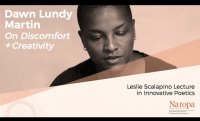Shin Yu Pai is the current poet laureate of Redmond, Washington and a speaker for the Humanities Washington Speaker Bureau. She is the author of eight books of poetry and serves as poetry editor for Lawrence & Crane Publications. In addition to her work as a poet, she has published personal essays and exhibited photography and book arts at galleries and museums. She is a former poet in residence for the Seattle Art Museum and her poems have been commissioned by the Dallas Museum of Art and Yakama Nation Museum.
 During National Poetry Month, I inevitably overbook events and find myself scrambling to meet my commitments. Though I love meeting new audiences, by the end of the month, I’m very ready to go back to being an introvert. Two of my favorite events this spring were programs that Poets & Writers helped to make possible.
During National Poetry Month, I inevitably overbook events and find myself scrambling to meet my commitments. Though I love meeting new audiences, by the end of the month, I’m very ready to go back to being an introvert. Two of my favorite events this spring were programs that Poets & Writers helped to make possible.
I’ve been touring a talk for Humanities Washington that focuses on the evolution of my work as a writer—moving from the practice of ekphrastic writing to doing collaborative work with photographers, archivists, musicians, and sound engineers to arriving at a hybrid creative practice that brings together my passion for photography, sound, installation, and text in public art projects installed on bike trails and apple orchards. The talk, which includes a slide show and poetry reading, attracts people from wide backgrounds. At my program in the Seattle suburb of Burien, I talked with painter and experimental filmmaker Ken DeRoux about how working as a former museum curator and museologist has influenced my work. And sculptor Phillip Levine and I chatted about the ways in which the visual and the textual intersect. I can’t wait to visit his studio.
This past week, I visited community college students in Jared Leising’s English class at Cascadia College. I talked to students about the idea of an artful, expressive life versus putting any definition around poetry or visual arts. Before my presentation, I toured a small gallery connected to the lecture hall to view works of art responding to the theme of “resistance.” They ranged from images of protestors in Seattle’s many recent marches to more subtle takes on issues like immigration, Black Lives Matter, and the Dakota Access Pipeline (DAPL). Afterwards, Jared and I talked about the strategy of ekphrastic writing—how it invites a response to an object or thing, though the thing can just as easily be a concept or idea. We spoke of how a beginning writer might enact their own resistance on the page by responding to some deeper issue or calling that brings forth some desire to speak.
As I pulled together my belongings to leave, a trio of students stopped me to ask me about translation. Linda had been translating her teacher Jared’s poems from English into Chinese and they didn’t make sense. We talked about how cultural context and story run deeper than words. Though it took me a minute to find my bearings, I remembered that the act of writing about visual arts is its own kind of translation. As we parted, Linda’s friend from Sichuan province said that they so rarely see Asian visitors in the classroom. “We’re so proud of you,” he said. His comment brought me back to the joy of public speaking—that this sharing of work need not be self-indulgent, but what it must be is a gesture towards greater connection and generosity.
Support for Readings & Workshops in Seattle is provided by an endowment established with generous contributions from the Poets & Writers Board of Directors and others. Additional support comes from the Friends of Poets & Writers.
Photo: Shin Yu Pai (Credit: Piper Hanson Photography).





 During National Poetry Month, I inevitably overbook events and find myself scrambling to meet my commitments. Though I love meeting new audiences, by the end of the month, I’m very ready to go back to being an introvert. Two of my favorite events this spring were programs that Poets & Writers helped to make possible.
During National Poetry Month, I inevitably overbook events and find myself scrambling to meet my commitments. Though I love meeting new audiences, by the end of the month, I’m very ready to go back to being an introvert. Two of my favorite events this spring were programs that Poets & Writers helped to make possible.